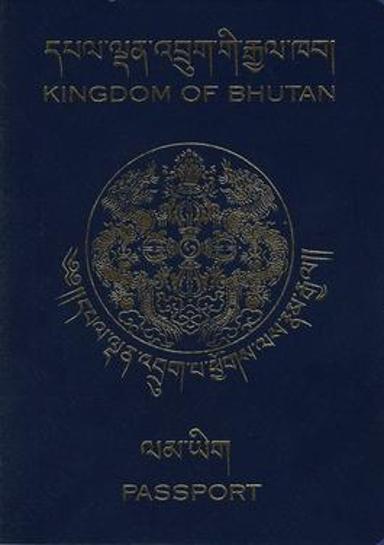
 Bhutan
Bhutan
 Bhutan
Bhutan Albania
Albania Antigua and Barbuda
Antigua and Barbuda Armenia
Armenia Australia
Australia Bahamas
Bahamas Bahrain
Bahrain Benin
Benin Botswana
Botswana Burkina Faso
Burkina Faso Cameroon
Cameroon DR Congo
DR Congo Ivory Coast
Ivory Coast El Salvador
El Salvador Equatorial Guinea
Equatorial Guinea Ethiopia
Ethiopia Gabon
Gabon Georgia
Georgia Guinea
Guinea Indonesia
Indonesia Iraq
Iraq Kazakhstan
Kazakhstan Kenya
Kenya Kyrgyzstan
Kyrgyzstan Lesotho
Lesotho Libya
Libya Moldova
Moldova Mongolia
Mongolia Myanmar
Myanmar Nigeria
Nigeria Oman
Oman Pakistan
Pakistan Papua New Guinea
Papua New Guinea Qatar
Qatar Saint Kitts and Nevis
Saint Kitts and Nevis Sao Tome and Principe
Sao Tome and Principe Sierra Leone
Sierra Leone South Korea
South Korea South Sudan
South Sudan Syria
Syria Tajikistan
Tajikistan Togo
Togo Uganda
Uganda United Arab Emirates
United Arab Emirates Vietnam
Vietnam Afghanistan
Afghanistan Algeria
Algeria Andorra
Andorra Angola
Angola Argentina
Argentina Austria
Austria Azerbaijan
Azerbaijan Belarus
Belarus Belgium
Belgium Belize
Belize Bosnia and Herzegovina
Bosnia and Herzegovina Brazil
Brazil Brunei
Brunei Bulgaria
Bulgaria Canada
Canada Central African Republic
Central African Republic Chad
Chad Chile
Chile China
China Congo
Congo Costa Rica
Costa Rica Croatia
Croatia Cuba
Cuba Cyprus
Cyprus Czech Republic
Czech Republic Denmark
Denmark Dominican Republic
Dominican Republic Eritrea
Eritrea Estonia
Estonia Swaziland
Swaziland Fiji
Fiji Finland
Finland France
France Germany
Germany Ghana
Ghana Greece
Greece Grenada
Grenada Guatemala
Guatemala Guyana
Guyana Honduras
Honduras Hungary
Hungary Iceland
Iceland Ireland
Ireland Israel
Israel Italy
Italy Jamaica
Jamaica Japan
Japan Kiribati
Kiribati Kosovo
Kosovo Latvia
Latvia Liberia
Liberia Liechtenstein
Liechtenstein Lithuania
Lithuania Luxembourg
Luxembourg Malaysia
Malaysia Mali
Mali Malta
Malta Marshall Islands
Marshall Islands Mexico
Mexico Monaco
Monaco Montenegro
Montenegro Morocco
Morocco Namibia
Namibia Nauru
Nauru Netherlands
Netherlands New Zealand
New Zealand Niger
Niger North Korea
North Korea North Macedonia
North Macedonia Norway
Norway Paraguay
Paraguay Peru
Peru Poland
Poland Portugal
Portugal Romania
Romania Russia
Russia San Marino
San Marino Saudi Arabia
Saudi Arabia Senegal
Senegal Serbia
Serbia Slovakia
Slovakia Slovenia
Slovenia Solomon Islands
Solomon Islands Somalia
Somalia South Africa
South Africa Spain
Spain Sudan
Sudan Suriname
Suriname Sweden
Sweden Switzerland
Switzerland Taiwan
Taiwan Tonga
Tonga Trinidad and Tobago
Trinidad and Tobago Tunisia
Tunisia Turkey
Turkey Turkmenistan
Turkmenistan Ukraine
Ukraine United Kingdom
United Kingdom United States
United States Uruguay
Uruguay Uzbekistan
Uzbekistan Vanuatu
Vanuatu Vatican
Vatican Venezuela
Venezuela Yemen
YemenBhutan, a small kingdom in the Eastern Himalayas, is renowned for its stunning natural beauty and vibrant culture. The country is largely mountainous, with a climate that ranges from subtropical in the south to temperate in the highlands. Bhutan experiences five distinct seasons: summer, monsoon, autumn, winter, and spring.
The Bhutanese culture is deeply rooted in Buddhism, which is reflected in its traditional arts, festivals, and lifestyle. The population of about 800,000 people is largely of Tibetan descent and the official language is Dzongkha. Bhutan is the only country in the world to measure success in terms of Gross National Happiness, a philosophy that guides the government’s policies.
Bhutan’s economy is based on agriculture, forestry, and hydroelectric power. Tourism, strictly regulated to minimize environmental impact, also contributes significantly to the economy. Despite being one of the smallest economies in the world, Bhutan has seen rapid economic growth in recent years.
Bhutan is also known for its commitment to environmental conservation, with laws in place to ensure that at least 60% of the country remains forested for all future generations. It is the world’s only carbon-negative country, absorbing more carbon dioxide than it produces. This unique combination of cultural richness and environmental stewardship makes Bhutan a fascinating country to explore.